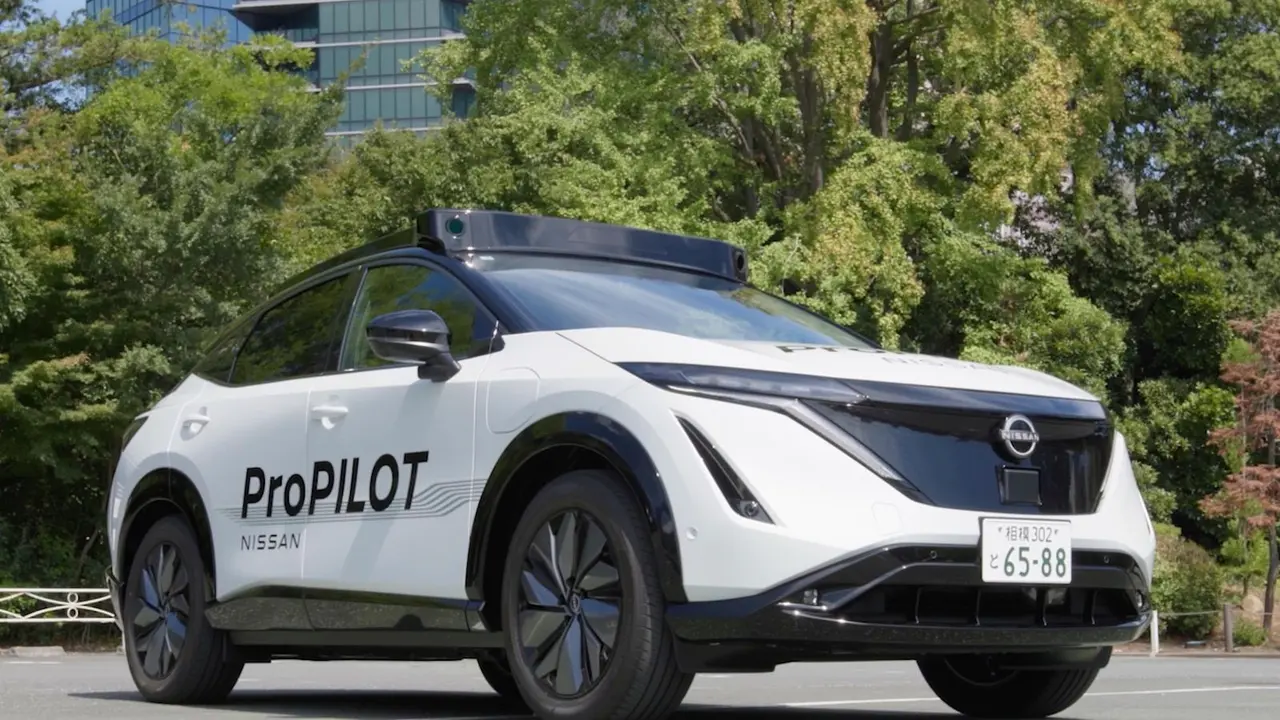Nissan Ventures into Urban Self-Driving Technology Amid Industry Challenges
6 Sources
6 Sources
[1]
Japanese automaker Nissan is developing self-driving technology
TOKYO (AP) -- Japanese automaker Nissan is developing new self-driving technology as it works to turn around its struggling auto business. In a recent demonstration of the technology, set to be available in 2027, a Nissan Ariya sedan outfitted with 11 cameras, five radars and a next-generation sensor called LiDAR maneuvered its way through downtown Tokyo, braking for red lights as well as pedestrians and other cars at intersections. Previous Nissan self-driving technology was designed for freeway driving, where the lanes are clearly marked and easier to decipher. The new technology is designed for congested, unpredictable city streets. It's an already-crowded field. The self-driving car market is estimated to reach $2 trillion by 2030, according to market researcher IndustryARC, riding on the back of advances in AI, sensor technologies and data processing capabilities. Japan's top automaker, Toyota Motor Corp., has a partnership deal with Waymo, another self-driving technology developed by Google. Waymo has also arrived in Japan, in partnership with a cab company, but it's still in the testing stage. Other automakers are also working on autonomous driving technology, including Honda Motor Co., General Motors and Mercedes-Benz, as well as companies outside the auto industry like Amazon and its subsidiary Zoox. Nissan's push comes at a time when the overall Japanese auto market is facing serious challenges because of President Donald Trump's tariffs. Nissan especially is struggling. It has slashed jobs and appointed a new chief executive, Ivan Espinosa, to attempt a turnaround. The maker of the March subcompact, Leaf electric cars and Infiniti luxury brand posted losses for the April-June period, following a fiscal year of red ink.
[2]
Nissan's latest comeback attempt: self-driving vehicles equipped with Wayve's technology
Nissan has yet to reveal models but did say the vehicles would be available in 2027. Japanese automaker Nissan is developing vehicles with self-driving technology as it works to turn around its struggling auto business. In a recent demonstration of the technology developed by British company Wayve, a Nissan Ariya sedan outfitted with 11 cameras, five radars and a next-generation sensor called LiDAR maneuvered its way through downtown Tokyo, braking for red lights as well as pedestrians and other cars at intersections. It's set to be available in 2027, although Nissan did not give the models or other details. It's an already-crowded field. The self-driving car market is estimated to reach $2 trillion by 2030, according to market researcher IndustryARC, riding on the back of advances in AI, sensor technologies and data processing capabilities. Japan's top automaker, Toyota Motor Corp., has a partnership deal with Waymo, another self-driving technology developed by Google. Waymo has also arrived in Japan, in partnership with a cab company, but it's still in the testing stage. Other automakers are also working on autonomous driving technology, including Honda Motor Co., General Motors and Mercedes-Benz, as well as companies outside the auto industry like Amazon and its subsidiary Zoox. Nissan's push comes at a time when the overall Japanese auto market is facing serious challenges because of President Donald Trump's tariffs. Nissan especially is struggling. It has slashed jobs and appointed a new chief executive, Ivan Espinosa, to attempt a turnaround. The maker of the March subcompact, Leaf electric cars and Infiniti luxury brand posted losses for the April-June period, following a fiscal year of red ink.
[3]
Japanese automaker Nissan is developing self-driving technology
TOKYO -- Japanese automaker Nissan is developing new self-driving technology as it works to turn around its struggling auto business. In a recent demonstration of the technology, set to be available in 2027, a Nissan Ariya sedan outfitted with 11 cameras, five radars and a next-generation sensor called LiDAR maneuvered its way through downtown Tokyo, braking for red lights as well as pedestrians and other cars at intersections. Previous Nissan self-driving technology was designed for freeway driving, where the lanes are clearly marked and easier to decipher. The new technology is designed for congested, unpredictable city streets. It's an already-crowded field. The self-driving car market is estimated to reach $2 trillion by 2030, according to market researcher IndustryARC, riding on the back of advances in AI, sensor technologies and data processing capabilities. Japan's top automaker, Toyota Motor Corp., has a partnership deal with Waymo, another self-driving technology developed by Google. Waymo has also arrived in Japan, in partnership with a cab company, but it's still in the testing stage. Other automakers are also working on autonomous driving technology, including Honda Motor Co., General Motors and Mercedes-Benz, as well as companies outside the auto industry like Amazon and its subsidiary Zoox. Nissan's push comes at a time when the overall Japanese auto market is facing serious challenges because of President Donald Trump's tariffs. Nissan especially is struggling. It has slashed jobs and appointed a new chief executive, Ivan Espinosa, to attempt a turnaround. The maker of the March subcompact, Leaf electric cars and Infiniti luxury brand posted losses for the April-June period, following a fiscal year of red ink.
[4]
Japanese automaker Nissan is developing self-driving technology
TOKYO (AP) -- Japanese automaker Nissan is developing new self-driving technology as it works to turn around its struggling auto business. In a recent demonstration of the technology, set to be available in 2027, a Nissan Ariya sedan outfitted with 11 cameras, five radars and a next-generation sensor called LiDAR maneuvered its way through downtown Tokyo, braking for red lights as well as pedestrians and other cars at intersections. Previous Nissan self-driving technology was designed for freeway driving, where the lanes are clearly marked and easier to decipher. The new technology is designed for congested, unpredictable city streets. It's an already-crowded field. The self-driving car market is estimated to reach $2 trillion by 2030, according to market researcher IndustryARC, riding on the back of advances in AI, sensor technologies and data processing capabilities. Japan's top automaker, Toyota Motor Corp., has a partnership deal with Waymo, another self-driving technology developed by Google. Waymo has also arrived in Japan, in partnership with a cab company, but it's still in the testing stage. Other automakers are also working on autonomous driving technology, including Honda Motor Co., General Motors and Mercedes-Benz, as well as companies outside the auto industry like Amazon and its subsidiary Zoox. Nissan's push comes at a time when the overall Japanese auto market is facing serious challenges because of President Donald Trump's tariffs. Nissan especially is struggling. It has slashed jobs and appointed a new chief executive, Ivan Espinosa, to attempt a turnaround. The maker of the March subcompact, Leaf electric cars and Infiniti luxury brand posted losses for the April-June period, following a fiscal year of red ink. ___ Yuri Kageyama is on Threads: https://www.threads.com/@yurikageyama
[5]
Japanese Automaker Nissan Is Developing Self-Driving Technology
In this image made from video provided by Nissan Motor Co., Japanese automaker Nissan's test vehicle featuring an automated driving system packed with artificial intelligence moves on a road in Tokyo on September, 2025. (Nissan Motor Co. via AP) TOKYO (AP) -- Japanese automaker Nissan is developing new self-driving technology as it works to turn around its struggling auto business. In a recent demonstration of the technology, set to be available in 2027, a Nissan Ariya sedan outfitted with 11 cameras, five radars and a next-generation sensor called LiDAR maneuvered its way through downtown Tokyo, braking for red lights as well as pedestrians and other cars at intersections. Previous Nissan self-driving technology was designed for freeway driving, where the lanes are clearly marked and easier to decipher. The new technology is designed for congested, unpredictable city streets. It's an already-crowded field. The self-driving car market is estimated to reach $2 trillion by 2030, according to market researcher IndustryARC, riding on the back of advances in AI, sensor technologies and data processing capabilities. Japan's top automaker, Toyota Motor Corp., has a partnership deal with Waymo, another self-driving technology developed by Google. Waymo has also arrived in Japan, in partnership with a cab company, but it's still in the testing stage. Other automakers are also working on autonomous driving technology, including Honda Motor Co., General Motors and Mercedes-Benz, as well as companies outside the auto industry like Amazon and its subsidiary Zoox. Nissan's push comes at a time when the overall Japanese auto market is facing serious challenges because of President Donald Trump's tariffs. Nissan especially is struggling. It has slashed jobs and appointed a new chief executive, Ivan Espinosa, to attempt a turnaround. The maker of the March subcompact, Leaf electric cars and Infiniti luxury brand posted losses for the April-June period, following a fiscal year of red ink. ___ Yuri Kageyama is on Threads: https://www.threads.com/@yurikageyama
[6]
Nissan revamps ProPilot to rival Tesla's driver-assist technology
Nissan Motor is on a mission under new CEO Ivan Espinosa to rebuild its business, and while refreshing its lineup is a key part of that, so is winning back customers who demand cutting-edge technology. Leveraging its partnership with Wayve Technologies, a U.K.-based artificial intelligence startup backed by SoftBank Group, Nissan is preparing to launch the newest generation of its ProPilot driver-assistance system during the fiscal year ending March 2028. The automaker says the most advanced iteration of its driver-assist technology will be on par with Tesla's Full Self-Driving, which despite its name requires human supervision and intervention. While the systems still amount to Level 2 autonomy -- meaning a person must always be ready to take over -- ProPilot amounts to Nissan's best foot forward in contending with the U.S. EV giant and Alphabet's Waymo in the race to build self-driving cars.
Share
Share
Copy Link
Nissan demonstrates new self-driving technology for city streets, aiming for a 2027 release. The move comes as the automaker seeks to revitalize its struggling business in a competitive autonomous vehicle market.
Nissan's Urban Self-Driving Technology
Nissan, the Japanese automaker, is making significant strides in the development of self-driving technology as part of its efforts to revitalize its struggling business. In a recent demonstration, Nissan showcased its latest autonomous driving system, designed specifically for navigating complex urban environments
1
3
.
Source: AP
The demonstration featured a Nissan Ariya sedan equipped with an impressive array of sensors: 11 cameras, five radars, and a next-generation LiDAR system. This technologically advanced vehicle successfully maneuvered through the bustling streets of downtown Tokyo, showcasing its ability to brake for red lights, pedestrians, and other vehicles at intersections
1
4
.
Source: ABC News
Advancements in Autonomous Driving
Nissan's new technology represents a significant leap forward from its previous self-driving systems, which were primarily designed for freeway driving with clearly marked lanes. The latest iteration is specifically engineered to handle the unpredictable nature of congested city streets, presenting a more challenging environment for autonomous vehicles
3
.
Source: Japan Times
The company plans to make this technology available by 2027, although specific vehicle models have not yet been announced
2
. This timeline places Nissan in the midst of a rapidly growing and highly competitive market for self-driving technology.Market Competition and Partnerships
The self-driving car market is projected to reach a staggering $2 trillion by 2030, according to market researcher IndustryARC. This growth is fueled by advancements in artificial intelligence, sensor technologies, and data processing capabilities
1
4
.Nissan's push into this space comes as other major players are also making significant investments:
- Toyota Motor Corp. has partnered with Waymo, Google's self-driving technology division
- Honda Motor Co., General Motors, and Mercedes-Benz are developing their own autonomous driving systems
- Tech giants like Amazon and its subsidiary Zoox are also entering the market
1
5
Related Stories
Nissan's Business Challenges
Nissan's foray into advanced self-driving technology comes at a crucial time for the company. The Japanese auto market as a whole is facing challenges due to international trade tensions, and Nissan, in particular, has been struggling financially
4
5
.The company has taken several steps to address these issues:
- Implementing job cuts to reduce costs
- Appointing a new chief executive, Ivan Espinosa, to lead turnaround efforts
- Focusing on innovative technologies like autonomous driving to regain market competitiveness
Despite these efforts, Nissan reported losses for the April-June period, following a fiscal year of negative financial results
2
5
.References
Summarized by
Navi
[2]
[4]
Related Stories
Nissan Tests Autonomous Vehicles in Japan, Aiming to Catch Up with Global Leaders
10 Mar 2025•Technology

Nissan Partners with UK AI Startup Wayve for Advanced Self-Driving Technology
10 Apr 2025•Technology

UK-based Wayve Expands to Japan, Advancing AI-Driven Autonomous Driving Technology
22 Apr 2025•Technology

Recent Highlights
1
Grok's 'Good Intent' Policy Enables CSAM Generation as Regulators Launch Global Investigations
Policy and Regulation

2
OpenAI launches ChatGPT Health to connect medical records to AI amid accuracy concerns
Technology

3
Google and Character.AI settle first major lawsuits over teen suicide linked to AI chatbots
Policy and Regulation





